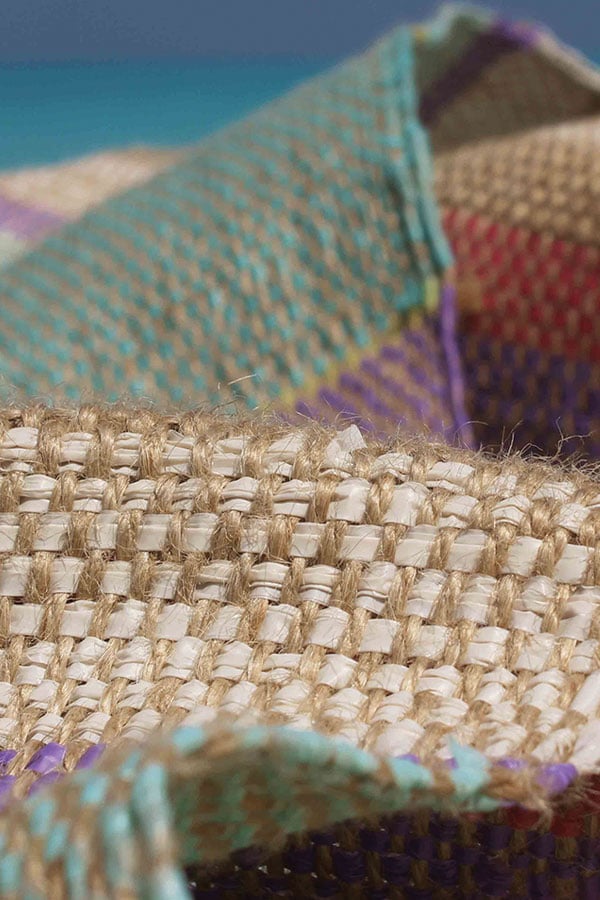Meet the Egyptian Designers Using Design To Create A Better Quality Of Life

Dealing with plastic waste has become a matter of global urgency as the world can no longer afford to ignore the harm the material is having on our world and on our lives. In Egypt, Reform an award-winning product design studio is pioneering the use of discarded plastic bags and upcycling them into sustainable fabrics for interior and lifestyle products. I caught up with the founders to chat about using design to create a better quality of life.
1. Please introduce yourselves, tell us a bit about your background, where you are based, and how Reform Studio started?
We are Hend Riad and Mariam Hazem product designers and graduates of Applied Sciences and Arts of the German University in Cairo. During our final semester in Uni, directly after the 2011 revolution in Egypt, we were super-excited to be part of the great change around us, eager to make a stand and to make a difference.
The feeling of responsibility towards serving our society and environment gave us the motivation to try to solve one of the major problems in Egypt: waste. We started to deal with waste as a raw material, trying to transform its negative impact into a more positive one. After researching the topic, we found out that plastic bags are the second most-used and discarded product in Egypt. Every minute globally around 9 million plastic bags are given out for free, while the average use of a plastic bag is just 12 minutes. An estimated 120 barrels of oil are required to make the bags we consume in minutes, with 12 million barrels of oil a year being used in the USA alone. This is how we came up with our first product Plastex, and this is how Reform Studio was born.

2. What is the thinking behind your craft, what inspires your designs and why do you use the materials that you do?
Environmentally; plastic bags take up to a thousand years to degrade into harmful substances that poison soil, pollute water, and create harmful diseases. The approach behind Plastex is to prolong the lifecycle of plastic bags before they end up as litter. Worldwide more than 4 billion plastic bags end up as litter each year.
Socially; Reform took on the challenge of reviving the weaving industry in Egypt, with our main goal being to restore an old craft that goes back to more than 1000 years ago and is on the brink of extinction. The automation of the weaving industry affected handmade crafts to an extent that craftsmen are no longer able to make a living out from it. And this makes the craft in danger of dying out within a decade because the next generation is not picking it up. By focusing on empowering local communities and encouraging craftsmanship, Reform took the opportunity to help and empower underprivileged women with limited resources offering them new job opportunities with a steady sustainable income.
3. How does your home country inform your creativity? Where does it inspire you and how is it reflected in the work that you do?
The main factor behind our work is design for a cause. We design for a better quality of life. So what inspires us is simply solving problems through design. Whenever we start working on a new project, walking down the streets of Cairo, observing daily problems has become a ritual that plays an important role in our inspiration phase.

4. Is it hard to get motivated when working for yourself; and how do you stay motivated?
Having a vision and believing in our cause and the great impact our work is having both socially and environmentally, is what keeps us motivated.
5. What have been the challenges of setting up your own business?
Living in a male-driven country is a challenge, one that we are facing every day.

6. What advice would you give to designers wanting to start their own creative business?
Never give up on your dream and never lose faith! It’s not an easy road but it will be worth every second. Set your goals straight, shoot high and start running. “Only a life lived for others is worth living” said Albert Einstein.
Some of your dreams should be about others, try to give back to your surroundings, your community through doing what you love the most. Be passionate about your work, you won’t achieve anything if you don’t believe in yourself and in what you’re doing. Every person on this planet can make a difference, so make your existence meaningful!
7. Which other African designers are inspiring you and your work today?
Our African role model designer is Azza Fahmy, an Egyptian strong female jewelry designer who built an empire in a man driven country.
Our creativity can make a serious change in this world, our creativity is the creativity of the next century. – Mariam Hazem, Reform Studio
8. What more can be done by African countries (your own, included) to promote African design – both locally and on an international scale?
As an African designer, we need to put ourselves more out there; we need to be more exposed internationally. We have amazing cultures that differentiate us from any other continent, and when it comes to design we are very unique and sharp, that easily puts us at the edge.
Our creativity can make a serious change in this world, our creativity is the creativity of the next century.
Thank you to Hend and Mariam for taking the time to chat about their work. To find out more about Reform Studio visit: https://reformstudio.net
– Tapiwa Matsinde
[Image credits: The images shown belong to Reform Studio. If downloaded and used elsewhere as a courtesy please credit accordingly.]
Pin for later







